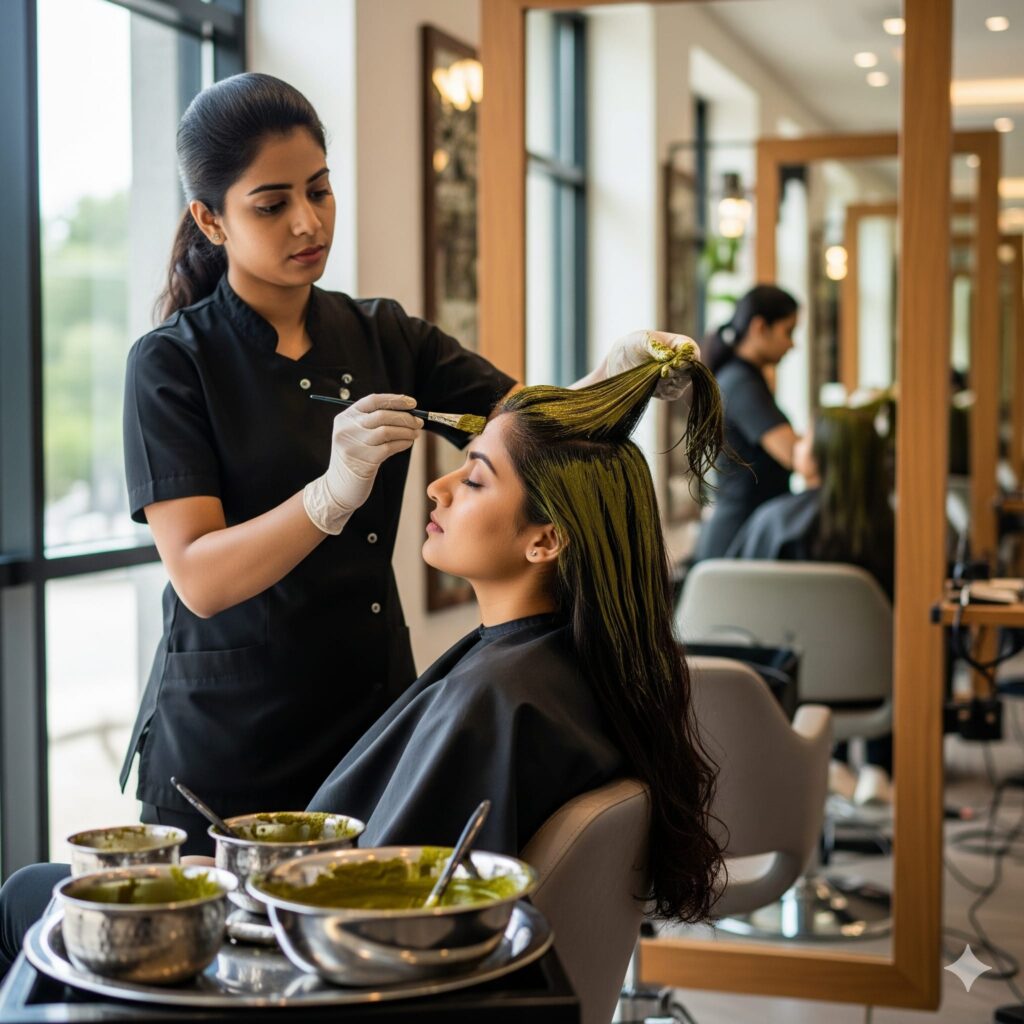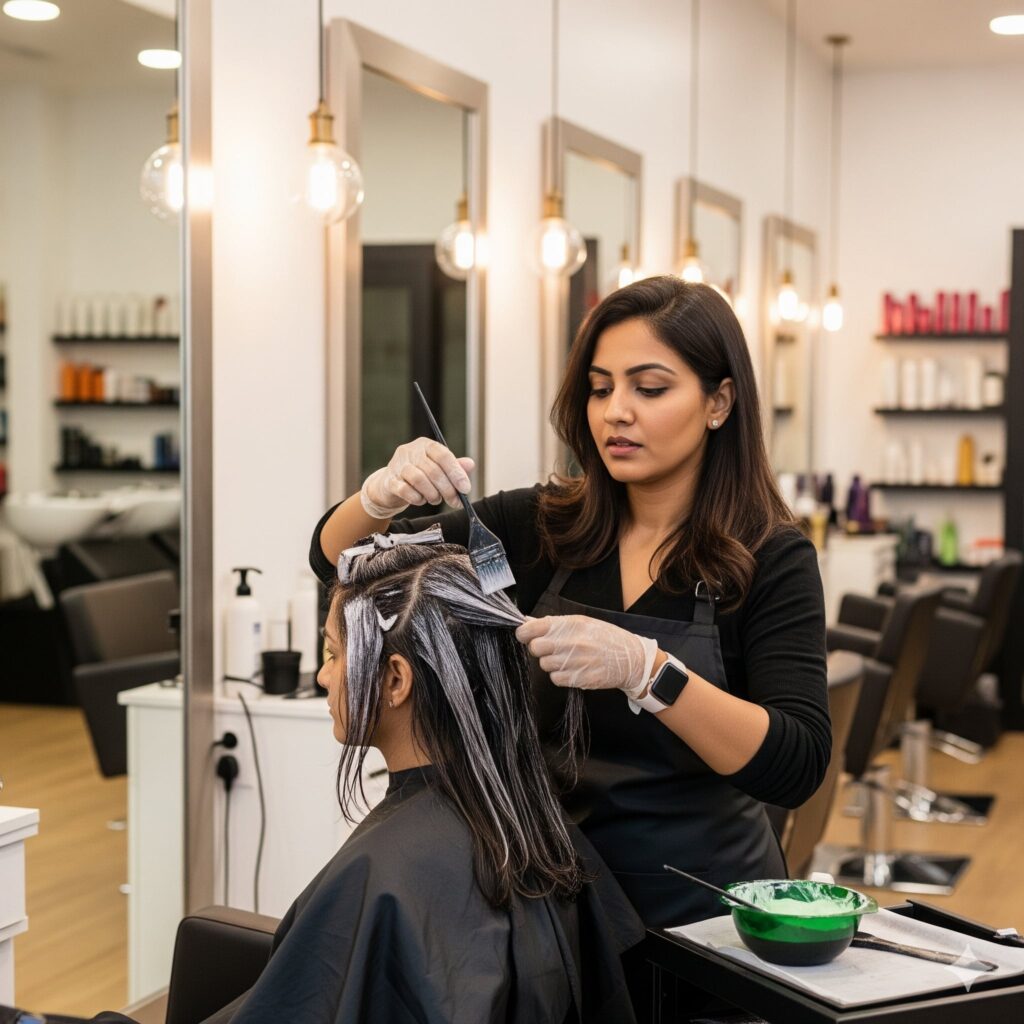While chemical based hair colour or hair dye is damaging the natural hair colour, Henna helps improve natural pigmentation and protects your natural hair colour. It helps cover gray, prevents premature greying and keeps your locks thick and lustrous.Hair coloring is a popular way to enhance appearance, express individuality, and cover grey hair. When considering henna vs hair color.
It’s important to understand their distinctive pros and cons to choose the best option for your hair health, desired look, and lifestyle.The debate of henna vs hair color often centers on side effects, benefits, and suitability for different hair types. This comprehensive guide on henna vs hair color covers what each method is, their types, benefits-including the advantages of applying henna on hair-drawbacks, application tips, and how to select the ideal choice for you.
Table of Contents
What is Henna?
Henna is a natural plant-based dye derived from the Lawsonia inermis plant, traditionally used for coloring hair and skin. When considering henna vs hair color, henna is prized as a chemical-free alternative that imparts a reddish-orange tint and conditions the hair. Many people prefer henna because unlike chemical hair dyes, it strengthens and nourishes the hair rather than damaging it.
The debate of henna vs hair color often comes down to hair health and desired results. Henna offers conditioning benefits and a natural finish, while conventional hair color provides a wider range of shades but may cause dryness or damage. For those seeking a gentle hair dye option, the henna vs hair color discussion highlights henna as a favorable choice for natural, healthy hair coloring.

Types of Henna
There are various types of henna, each offering unique benefits for hair care. When considering henna vs hair color, many prefer henna for its natural ingredients and conditioning properties. Unlike chemical hair dyes, henna vs hair color solutions provide a safer alternative for those with sensitive scalps. Understanding henna vs hair color helps you make an informed choice between natural and synthetic hair coloring options.
- Pure Henna: Gives a natural reddish-orange tint, free of additives.
- Neutral Henna: Made from a different plant, it conditions hair without adding color.
- Colored Henna Blends: Henna mixed with indigo, amla, or other natural ingredients for brown or black shades.
- Chemical Henna: Some commercial henna products may contain chemicals-caution is advised.

Advantages of Using Henna
When comparing henna vs hair color, henna stands out as a 100% natural and chemical-free option that nourishes and strengthens the hair. Unlike chemical dyes, henna vs hair color is gentle on the scalp, making it suitable for sensitive skin types. Overall, the choice of henna vs hair color depends on your priorities, but henna offers long-lasting color with added hair conditioning benefits.
- Naturally conditions and strengthens hair, improving texture and shine.
- Free from harsh chemicals like ammonia or peroxide found in dyes.
- Helps to cover grey hair with a natural tint.
- Can improve scalp health and reduce dandruff due to anti-fungal properties.
- Provides a lasting, vibrant color with regular use.
Disadvantages of Using Henna
When comparing henna vs hair color, one major disadvantage of henna is its limited color range, unlike hair color which offers more variety. In the henna vs hair color debate, henna’s drying effect and difficulty to remove make it less flexible than chemical hair colors. Overall, the henna vs hair color choice depends on personal preference but henna’s drawbacks like hair dryness and color permanence should be considered carefully.
- Limited color spectrum mainly in red, brown, and black shades.
- Results vary based on original hair color and texture.
- It takes longer to apply and develop color compared to conventional hair dyes.
- Difficult to remove or change once applied.
- Some natural henna may dry out hair if overused.

How to Apply Henna Powder
To apply henna powder effectively, first mix it into a smooth paste and apply evenly to clean, dry hair. When considering henna vs hair color options, henna offers a natural alternative with less chemical damage; unlike conventional hair dye, henna strengthens hair while coloring. If you’re weighing henna vs hair color, note that henna provides long-lasting, vibrant results without harsh chemicals, making it a popular choice for those seeking natural hair care.
- Mix henna powder with warm water and optional natural additives like lemon juice or tea.
- Let the paste sit for a few hours for dye release.
- Apply evenly to clean, dry hair.
- Cover with a plastic cap and leave for 1-4 hours depending on desired intensity.
- Rinse well, avoiding shampoo initially.
Side Effects of Henna on Hairs
The debate of henna vs hair color often centers around their effects on hair health and side effects. While henna vs hair color shows that henna is more natural and gentle, hair color offers a broader range of shades but with potential chemical risks. Understanding henna vs hair color side effects helps you make the right choice for your hair and scalp care.
- Overuse may cause dryness or stiffness.
- Impurities or adulterated products could lead to scalp irritation.
- Color results may be unpredictable depending on hair type.
- Difficult to apply over chemically treated or dyed hair without color streaking.
Explore various stylish saree draping techniques to elevate your traditional look.
What is Hair Color?
Hair color generally refers to chemical dyes used to permanently or semi-permanently change hair shade. When considering henna vs hair color, chemical dyes typically contain ammonia, peroxide, and pigments to lighten or deposit color on the hair shaft. The choice between henna vs hair color depends on whether you prefer natural or chemical-based options.
Henna vs hair color also differs in effects on hair health and longevity. While chemical hair colors offer a vast spectrum of bold shades, henna provides a natural, plant-based alternative that coats and nourishes the hair. Understanding henna vs hair color can help you choose a safe and beautiful option tailored to your needs.

Types of Hair Color
When choosing between henna vs hair color, it is important to understand how each option affects your hair’s health and appearance. Henna vs hair color offers different pros and cons: henna is a natural alternative that nourishes and strengthens hair, while hair color often provides a wider range of shades and faster results. For those deciding on henna vs hair color, it’s essential to consider factors like longevity, scalp sensitivity, and desired color outcome to make the best choice for their hair type.
- Permanent Hair Color: Chemical reaction lightens natural pigment and deposits new color for a lasting effect.
- Semi-Permanent Hair Color: Deposits color without bleaching, lasting for several washes.
- Demi-Permanent Hair Color: Uses low peroxide, fades gradually without sharp root lines.
- Temporary Hair Color: Coats hair surface and washes out in one shampoo.
- Highlights and Balayage: Partial coloring techniques for dimension.
Advantages of Hair Color
When comparing henna vs hair color, one of the biggest advantages of henna is that it is completely natural and free from harsh chemicals. In the henna vs hair color debate, henna stands out for its ability to nourish and strengthen hair while providing a beautiful, natural hue. However, those looking for a wider range of color options often prefer traditional dyes. Understanding henna vs hair color can help you choose the best option based on your hair health and styling needs.
- Wide variety of shades and finishes to choose from.
- Ability to lighten hair, cover greys effectively.
- Quick results with visible color change after one application.
- Suitable for fashion-forward or natural looks.
- Can be tailored by professionals for nuanced effects.
Disadvantages of Hair Color
When considering hair color options, the debate of henna vs hair color is important. Unlike henna, hair color often contains harsh chemicals that can damage the hair and scalp. In the henna vs hair color comparison, henna is gentler and promotes hair health, while hair color may cause dryness, irritation, and requires frequent touch-ups. Understanding henna vs hair color helps in making a safer and healthier choice for hair care.
- Contains chemicals that may damage hair and scalp.
- Potential allergic reactions and scalp sensitivity.
- Requires regular touch-ups to maintain vibrant color.
- Can cause dryness, brittleness, and hair breakage with frequent use.
- Improper use may lead to uneven or dull color.

Side Effects of Hair Color
When comparing henna vs hair color, it is important to understand the potential side effects of hair color. Unlike henna, which is natural and conditions the hair, chemical hair color can cause scalp irritation, allergies, and weaken the hair shaft over time. Many considering henna vs hair color choose henna to avoid these side effects and keep their hair healthy and strong.
- Itching, redness, or burning sensation on the scalp.
- Hair dryness, split ends, and breakage due to chemical processing.
- Allergic reactions to ingredients like paraphenylenediamine (PPD).
- Possible scalp irritation or dermatitis with improper mixing/application.
Learn simple, effective makeup tips to effortlessly cover dark under-eye circles.
Difference Between Henna and Hair Color
When deciding between henna vs hair color, it is important to understand their differences. Henna vs hair color differs greatly in composition, with henna being a natural plant-based dye and hair color typically containing chemicals. For those considering henna vs hair color, henna is gentler and conditions the hair, while hair color offers a wider range of shades and longer-lasting results.
| Feature | Henna | Hair Color |
| Composition | Natural plant-based dye | Chemical-based dyes with ammonia, peroxide |
| Color Range | Red, brown, black shades mainly | Extensive palette from natural to vibrant |
| Effect Duration | Semi-permanent, lasting weeks to months | Permanent or semi-permanent, longer-lasting |
| Hair Health Impact | Conditions and strengthens hair | Potentially damaging due to harsh chemicals |
| Application Time | Longer, several hours required | Faster, around 30-60 minutes |
| Removal | Difficult to remove | Possible with chemical treatments |
| Grey Coverage | Effective with repeated application | Immediate and complete coverage |
Remove tan easily at home with simple, natural remedies explained in this blog.
Choosing the Right Option
When deciding between henna vs hair color, it’s important to consider your hair type and desired results. Henna vs hair color offers different benefits-henna is natural and nourishing, while hair color delivers faster, more varied shades. Ultimately, choosing between henna vs hair color depends on whether you prioritize hair health or immediate color change.
- Choose henna if you prefer natural, chemical-free coloring with added hair conditioning benefits.
- Opt for hair color for significant color changes, grey coverage, or a broad shade selection.
- Consider hair condition-damage-prone hair benefits from henna’s nurturing effects.
- Allergy history should guide chemical hair color usage.
- Evaluate maintenance willingness: henna requires less frequent touch-ups but longer application.

Discover how regular hair trimming promotes healthy growth and vibrant shine.
Conclusion
The choice between henna vs hair color depends on balancing natural hair care and color options. With henna vs hair color, henna provides conditioning benefits, natural pigments, and scalp care without harsh chemicals. Meanwhile, henna vs hair color with traditional hair color offers a wide spectrum of shades and powerful grey coverage but may involve chemical risks and higher maintenance. Understanding henna vs hair color and their side effects helps you pick the best option to enhance your hair beautifully and safely.
For personalized hair color advice and expert tips tailored to your unique hair needs, visit Peacock Salon in Vashi, Navi Mumbai. Our skilled colorists specialize in vibrant, healthy, and lasting hair color treatments. Find us at Mahavir Center, Shop No. 20, 21, 21A, 22, next to Golden Punjab Hotel, Sector 17, Vashi or call +91 9324774567 to book your consultation and transform your hair with professional color care.
Henna vs Hair Color – FAQs
What is the difference between henna and hair color?
Henna is a natural plant-based dye that conditions hair, while hair color uses chemicals to permanently change shade with a wider color range.
Is henna better than hair color?
Henna is safer and nourishing but offers limited shades. Hair color offers versatility but may damage hair due to chemicals.
What are the benefits of applying henna on hair?
Henna conditions hair, strengthens strands, adds natural reddish tones, and improves scalp health without harsh chemicals.
What are the side effects of hair color?
Possible dryness, irritation, allergic reactions, and hair damage from chemical ingredients.
What are the side effects of henna on hair?
Rare but may cause dryness or scalp irritation if impure or overused.
How to apply henna powder?
Mix with warm water, apply to clean hair, leave for 1-4 hours, then rinse without shampoo initially.
How to apply hair color?
Section clean hair, apply color from roots to ends, leave as directed, rinse, and condition.
Can henna cover grey hair?
Yes, it stains grey hair reddish-brown but may require repeated applications.
How long does henna last on hair?
Henna can last 4-6 weeks depending on hair care and original color.
Can I switch from chemical hair color to henna?
Yes, but losing even pigmentation and prior chemicals may affect henna’s final shade.
